- Home
- Greg Keyes
The Born Queen Page 2
The Born Queen Read online
Page 2
“Yes,” Harriot replied.
Anne smiled. “How convenient that I brought two thousand, then.”
Harriot felt his heart all but stop in his chest.
“Majesty?”
“This was indeed a trap, Sir Harriot,” she said. Something tightened around her eyes, and then she reached forward so that the heel of her hand came against his forehead.
He felt the bones in his skin go suddenly heavy and febrile. He fell to his knees, but she did not release the contact. His skin everywhere stung, his lungs seemed full of flies. And in his head…
He saw St. Abulo’s host in their camp, waiting for the morning, some sleeping, some on watch. He seemed to be one of the watchmen, suddenly crushed by this same black torpor, and he watched, uncaring, as nimble shadows slipped into the camp, slitting the throats of the sleeping and waking alike. Some woke and managed to fight, but it wasn’t long before all five hundred were dead. The eyes he watched through dimmed, and he felt himself dragged along as if by a swift river, and screamed…
He came back to the sunlight gasping, watching the distant corpses swinging from their branches. His breeches were wet.
He looked up at the queen, and her smile broadened into a terrible thing.
“Now about your surrender,” she said.
Harriot summoned a dogged reserve of will. “Do you understand what you’ve done?” He gasped. “The full wrath of the Church will fall on you now. There will be holy war.”
“Let z’Irbina come,” she replied. “I have seen enough of their work. Let them come and receive the justice they deserve.”
Harriot steadied his breath and felt his fever fade. “That’s bold talk,” he said. “How is the Hansan fleet?”
“Encamped along our coast, as you must know,” Anne replied.
“And you truly believe you can fight Hansa and the holy Church?”
Her gaze intensified, and he flinched. It took all he had in him not to cower.
“What do you think?” she asked softly.
I think you are mad, he silently opined, but he could not say it.
She nodded, as if she had heard him, anyway. “I’ve a mind to let you return to z’Irbina,” she said. “So you can tell them what was done and said here. And let me add this: From this moment, all servants of the Church in z’Irbina shall either renounce their allegiance to that corrupt institution or leave our borders within the nineday. Beyond that time, any churchman, regardless of rank, will be arrested, imprisoned, and tried for treason against the empire. Is this clear enough for you to repeat, Sir Roger?”
“Very clear, Majesty,” he husked.
“Very well. Go. As you’ve pointed out, I’ve other things to attend to now.”
They let him keep his horse and arms. He went to the camp and found the bodies where they had fallen, most still in their blankets. The field was thick with ravens, and the clouds threatened rain.
Roger sat there for a few moments as the earth seemed to tilt. He didn’t know if Anne really understood what would happen now; even he couldn’t imagine the full scope of the slaughter that was now inevitable. The five hundred who had died here weren’t even a start.
HESPERO
His footsteps rang on the red marble, drifted up into the great dark hollow of the Caillo Vaillaimo, and came back to him like whispers from death.
I am come, they seemed to say.
Death walked with him, but fear came creeping behind.
Be still, he told himself. Be still. You are Marché Hespero, praifec of Crotheny. You are the son of Ispure of the Curnaxii. You are worthy.
“The holiest of holies,” the man a step behind him and to his left breathed.
Hespero glanced at him and saw that his gaze was wandering around the arching buttresses, the thousands of niches with their gilded saints.
“That?” Hespero waved at the architecture. “Are you talking about the building, Brother Helm?”
“The Caillo Vaillaimo,” Helm replied. “Our most perfect temple.”
Hespero felt his brow pinch in a frown. He heard Sir Eldon, on his right, sigh, but the other six men in his entourage remained silent.
“You’ve learned nothing,” he told Helm.
“Your grace?” the brother asked, his voice sounding chastised but puzzled.
“Hush now. Be silent as we approach his eminence.”
“Yes, your grace.”
Hespero waved him off. Brother Helm’s mistake was a common one. The building had been built to impress, and it did, but in the end the structure was only a symbol. The real holy of holies was underneath the red marble and ancient foundations. He could feel it as he never had before with each touch of his foot against the stone: aching, awful power that made his bones feel burnt and his flesh rotten. His mouth tasted of soot and decay.
But Helm couldn’t feel that, could he? Death wasn’t with Helm.
On down the sacristy hall they went, but before they reached the grand nave, their guide led them to a side passage and up a staircase into the prayer halls with their writing lecterns and smell of lead, then around a corner, past the lesser scriftorium. He realized with a chill that they were making their way to the private suites of the Fratrex Prismo, but not by the most direct route.
“There’s no one here,” Brother Helm whispered. He had noticed it, too. “The corridors are all empty.”
“Quite,” Sir Eldon agreed.
Their escort didn’t glance back, but he surely had heard. Not that it mattered.
He’d been in this part of the Caillo only once, very long ago, when Niro Pihatur had been the Fratrex Prismo.
He thought he knew where they were going.
They came into a lozenge-shaped room, ostensibly a chapel to Lady Lasa; her winged and wreathed statue stood at the far end, smiling a knowing smile. At the moment, however, the place was filled not with worshippers but with Mamres monks. They were armed, and not with ceremonial weapons. At their head stood a figure in dark indigo robes and a black three-cornered hat that somewhat resembled a crown.
“Brother Mylton,” Hespero said, favoring the man with a short bow.
“I am a tribiceros now,” the cleric corrected.
“Yes, I see the hat,” Hespero said. “But you are still a brother, like all of us.”
Mylton smiled indulgently. His bulging eyes and narrow face had always made Hespero think of some sort of rodent. The hat didn’t really change the impression.
“You will submit to blindfolding, all of you,” Mylton said.
“Of course,” Hespero replied.
As the monks knotted darkness to his face, Hespero felt the floor beneath him thin even further, and his body shivered as if aching to tear itself into pieces.
Someone took him firmly by the arm.
“Step down,” a voice he did not know whispered.
He did, once, twice, thrice. In the end, he counted eighty-four steps, just as he had the last time. Then there was turning this way and that in air that tasted stale, until at last they stopped and the blindfolds were removed.
Perhaps they don’t plan to kill us, a small part of Hespero thought as his eyes adjusted to his new surroundings. Why bother keeping the way secret if we’re never coming out?
But another part of him knew that was stupid. It was ritual. Any intelligent, attentive person—and certainly any initiate of Decmanus, for instance—would be able to find his way back here, blindfolded or not. Only initiates and sacrifices made this journey to the place beneath, to the real Caillo Vaillaimo.
He began picking out details in the guttering light of the torches that plenished two score wall sockets. The chamber was carved into the living stone the temple was built upon, its natural sandy hue made orange by the firelight. Rows of semicircular benches climbed before him, but all were empty save for three seats raised up at the back and the throne behind them. Two of the three were occupied by the other two tribiceri, and as Hespero watched, Mylton completed their number.
The Fratrex Prismo
sat the throne, of course.
“Where are we?” Brother Helm asked.
“The Obfuscate Senaz of the Hierovasi,” Hespero replied.
The Fratrex Prismo suddenly raised his voice:
Commenumus
Pispis post oraumus
Ehtrad ezois verus Taces est.
“Izic deivumus,” the others chorused, and Hespero realized with faint surprise that he had responded along with everyone else.
Well, he had been in the Church a long while. Much of what he did was reflex.
Niro Fabulo had been in the clergy longer than Hespero. The Fratrex Prismo was almost eighty. The hair streaming from beneath the black-and-gold crown was white, and his eyes, once blue, had been bleached to tinted ice. He had an arched Vitellian nose and a persistent tick in his sagging left cheek.
“Well,” Fabulo said, almost sighing. “You surprise me, Hespero.”
“How so, your grace?”
“You’ve delivered yourself here after all of your crimes. I thought I would have to have you brought in by the ear.”
“You don’t know me very well, then,” Hespero said.
“Don’t be impertinent,” Fabulo snapped. He leaned back in his chair. “I’ll never know what Niro Lucio saw in you, I really won’t. I know you took your vows together, but that was more than thirty years ago.”
“I don’t understand what you’re implying,” Hespero said.
“When you left the college, you went off to some tiny attish in the Bairghs and distinguished yourself in no way whatever. But Lucio stayed here and rose in rank. When he was lustrated as praifec, he called for you. He swayed the senaz to make you amplulo of Crotheny and later praifec.”
“I’m flattered you know so much about me.”
“What I know does not flatter you,” he snapped. “And yet I knew Lucio. He was loyal, above all loyal to the Church. He was not one who usually counted friendship toward a qualification. I wonder if something more than friendship did not prompt your rise in position.”
“Does my record since that time suggest I was unqualified?”
Niro Fabulo shook his head. “No, indeed. You have been exemplary in every way, or at least that is what the record reflects. Until the last year or so, that is, and there things go very wrong. Shall I catalogue your major failures?”
“If it pleases you, your grace.”
“It does not, but I shall do so.” He leaned forward.
“You failed to stop William from naming his daughters as heirs. You promised to manage that mistake, yet again you failed. Not only is one of the daughters still alive, she now sits the throne. Now, that in itself is enough failure for a lifetime, Hespero. You failed to quicken the faneways of the shrouded lords in the King’s Forest. And despite all of this”—he mopped his brow with his sleeve—“despite all of this, my predecessor, your dear friend Lucio, entrusted you with the arrow of Aitas in order to slay the Briar King. This also you failed to do, and now the arrow is lost to us.”
Hespero started to retort to that last accusation, but thought better of it. What was the point? It was mostly true, especially as concerned Anne. He could only blame himself for choosing such unstable allies in the matter. The faneways were of little consequence, really, and Lucio had known that.
But Lucio was dead, most probably at the hand of the man now accusing him. Niro Fabulo didn’t begin to understand Hespero’s real failure.
“Finally,” the prismo concluded, “you took cowardly flight from your post in Eslen.”
“Did I?”
“Yes.”
“Interesting. In what month do your reports have that happening?
“Just after Yule.”
“That was when King Robert was on the throne and months before Anne raised her army. What do you imagine I was fleeing?”
“You left no explanation of your whereabouts,” Fabulo said. “What are we to assume?”
“Does it matter?” Hespero asked, his voice sounding eerily calm and uncustomarily blunt in his own ears. “You’ve murdered Lucio, and now you’re purging his friends. I’m one of them. Why all this talk?”
“Lucio was a fool,” Fabulo said. “Lucio never really understood the prophecies or what must be done now. He was too much of the past. But I think you and he were up to something. And I rather want to know what that was.”
“A failure like me? What could I be up to?” Hespero asked.
“That’s what we’re going to find out,” Fabulo said.
Hespero felt his throat go dry, and for an instant the words stuck in his throat, coming out as a sort of gasp.
“What?” the prismo demanded.
Hespero took a deep breath and raised his head.
“You are going to find out,” he repeated, clearly this time. “But not the way you’d like.”
Hespero saw Fabulo’s brow descend and his mouth open to speak.
I am Hespero, he thought. He clenched his teeth, then relaxed and let the incantation come.
“Shadowed saints who walk all ways, know all fanes. Be with me.”
He let the cold waters beneath the world rush in through his feet, and they went numb, followed quickly by his legs, crotch, and belly. He felt his heart stop, and he knew he did not have long. Then the numbness reached his head, and the voices around him dropped away. He could still see, but the figures before him appeared tiny, the torches like little brass jewels. He felt hollowed and stretched by the power of the fane beneath him.
What was he doing? Who was he? Faces were fading in his mind. He glanced at the man beside him and could not remember his name. The place itself no longer seemed familiar.
Now he felt a current tug; the tide had come into him, and now it was going out. When it went, it would take him with it.
Unless…
There was an “unless,” but he couldn’t remember what it was. But he did see something across the unfamiliar space, something his eye told him was the shape of a man but was also something else. It was a river, a stream, a swift bright current. It was beautiful, and he reached for it like a man dying of thirst.
Everything else was paling. The spring was too far away, and the pull inside him was so strong. He realized he had stopped breathing, and suddenly he no longer cared. He could rest, forget, sleep.
No. I am still Marché Hespero. Son of…
He couldn’t recall. With an inchoate cry, he flung himself at the effulgent waters, and something in him reached farther than his paralyzed body, and he felt the stream that wasn’t a stream with fingers that weren’t fingers, and he drew it into him as if drinking. The separation of his soul and corpse eased, and he drank deeper, opening himself completely as everything faded into black.
Impossible, someone seemed to say.
Hespero felt his grin, a grim crescent slicing through two worlds.
Impossible. You have not walked the faneway. Only I…
“You’re right,” Hespero said. “But I am attuned to it.”
Not as I am.
Hespero suddenly felt the chill replaced by fever, and his body stiffened, then began to dissolve.
“No,” he gritted.
Yes. You surprised me…
“Yes,” Hespero gasped.
But I am the more powerful here.
Hespero clenched his fists, but the strain tore his fingers loose from his hands. An instant later his shoulders sagged, and both arms dropped off.
No.
His spine wobbled and then began to crumble, and his torso almost gently collapsed as his knees dissolved. His body broke apart, the black current towing the pieces away.
Shivering with fear, Hespero renewed his grasp on the brightness even as he began to stretch thinner and thinner, becoming a stream himself.
“Here,” a voice suddenly said. He couldn’t see anything, but he suddenly felt something shivery and hot.
“I remember,” he murmured. “I remember this.”
“Then hurry. You will soon forget.”
The voice was right, for even as Hespero struck with the thing, he was no longer sure what he was doing, or why, or—
Something like a scream, and then, and then…
Revelation.
Images came first, fractured and whole. Scents, textures, pain and pleasure, the stuff of matter, the stuff of life but peeled off of life, adrift.
But no longer adrift. In him, now.
The first came from Fabulo: fear and exhilaration. Yes, it had been murder, Lucio’s death, subtle poison, but then, it was all too fast, a life falling backward, flashes jumping out. The electric tingle of the faneway of Saint Diuvo, the stroke of a woman’s fingers, running through a field of tall wheat, the tap of his head on the cold marble of a chapel in z’Espino, shivering, hot, confused in chaffing blankets, the softness of linen, wonder, a face that was the universe, the sweet scent of mother’s milk, pain, light…
And then, for a long while, Hespero could not think at all as the well of knowledge opened, filled him, and—just as he thought he could endure no more—closed.
Something spasmed, and he felt his fingernails biting into his palms, a painful vise on each arm, and in his chest a terrible shuddering.
My heart, he thought. My heart.
It shuddered again, and his chest felt crushed.
Then a thump, pause, thump-thump, pause, thump.
And the agony eased to hurt, then relief. Gasping, he opened his eyes.
“You did it,” Sir Eldon said. The knight was holding him up by his left arm. Brother Helm had the right.
He fought his gaze up the tiers of benches. Niro Fabulo slumped in his chair, eyes wide, skin already turning blue.
Mylton was just turning from the dead prismo, his jaw dropping.
“How?” he asked.
“The saints rejected him,” Hespero wheezed. “They chose me.”
“But you haven’t walked the faneway,” Mylton objected. “How could you use the holy source?”
“The saints make their will known through me directly,” Hespero asserted.
“That’s impossible.”
“It is a fact,” Hespero managed. “You all saw. You must have felt.”
“Yes,” another of the tribiceri—L’Ossel—said. “Don’t you see? Don’t you remember? It’s true. The prophecy says, ‘and he will draw the power of Saint Diuvo, although he has not walked in his steps.’”

 Godzilla
Godzilla Godzilla vs. Kong
Godzilla vs. Kong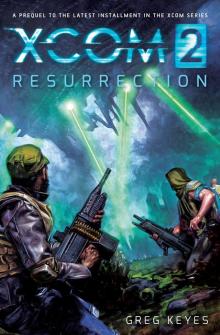 XCOM 2- Resurrection
XCOM 2- Resurrection Independence Day: Crucible (The Official Prequel)
Independence Day: Crucible (The Official Prequel)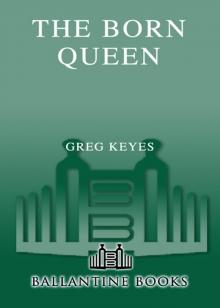 The Born Queen
The Born Queen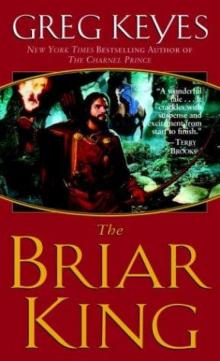 The Briar King
The Briar King Star Wars The New Jedi Order - Dark Journey - Book 10
Star Wars The New Jedi Order - Dark Journey - Book 10 Star Wars: New Jedi Order Book 8b: Emissary of the Void
Star Wars: New Jedi Order Book 8b: Emissary of the Void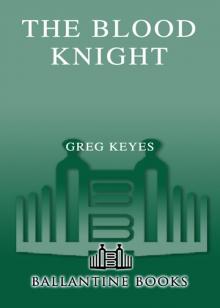 The Blood Knight
The Blood Knight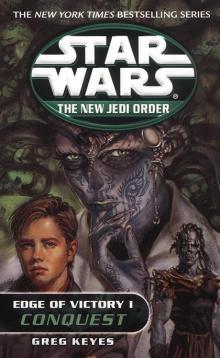 Star Wars - Edge of Victory - Book 1: Conquest
Star Wars - Edge of Victory - Book 1: Conquest Edge of Victory 2 Rebirth
Edge of Victory 2 Rebirth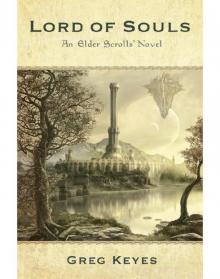 Lord of Souls: An Elder Scrolls Novel
Lord of Souls: An Elder Scrolls Novel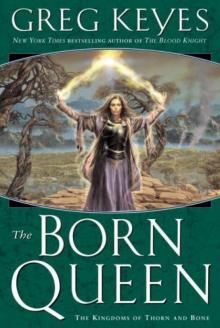 The Born Queen tkotab-4
The Born Queen tkotab-4 Rebirth: Edge of Victory II
Rebirth: Edge of Victory II Conquest: Edge of Victory I
Conquest: Edge of Victory I Emissary of the Void
Emissary of the Void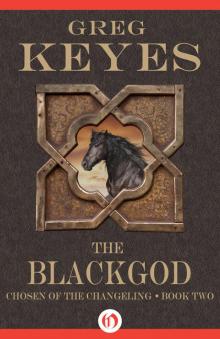 The Blackgod
The Blackgod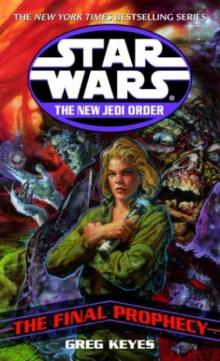 Star Wars The New Jedi Order - The Final Prophecy - Book 19
Star Wars The New Jedi Order - The Final Prophecy - Book 19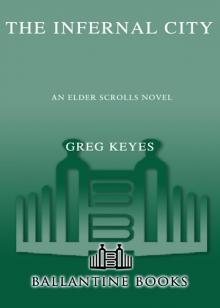 The Infernal City
The Infernal City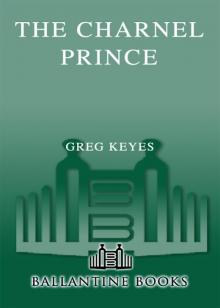 The Charnel Prince
The Charnel Prince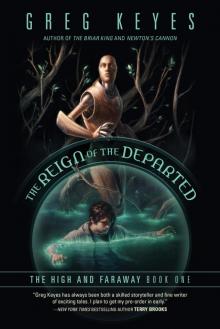 The Reign of the Departed
The Reign of the Departed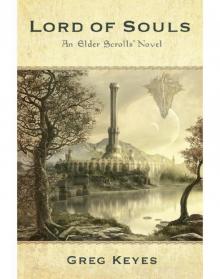 Lord of Souls es-2
Lord of Souls es-2 Chosen of the Changeling
Chosen of the Changeling Dawn of the Planet of the Apes
Dawn of the Planet of the Apes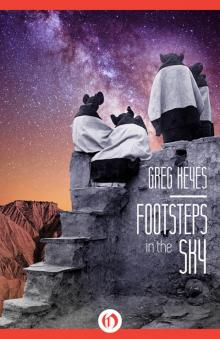 Footsteps in the Sky
Footsteps in the Sky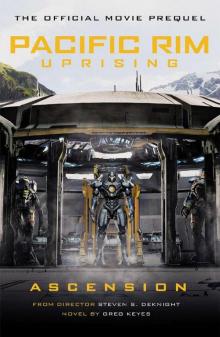 PACIFIC RIM UPRISING ASCENSION
PACIFIC RIM UPRISING ASCENSION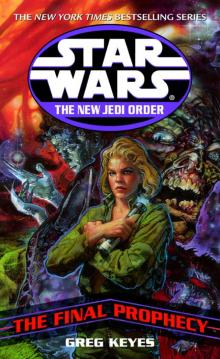 The Final Prophecy: Edge of Victory III
The Final Prophecy: Edge of Victory III